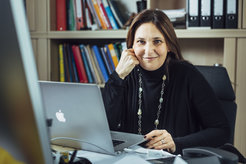Honouring the detection of gravitational waves: LIGO Scientific Collaboration among the “2016 Top 100 Global Thinkers”
AEI Scientist Maria Alessandra Papa, together with three LSC colleagues, will accept the award on behalf of the LIGO Scientific Collaboration on December 12, 2016, in a ceremony in Washington DC
Every year, the American magazine Foreign Policy honours the world’s preeminent thought leaders and public intellectuals. The magazine recognizes people “whose ideas have translated into action over the past year, thereby changing and shaping the world we live in.” Among the prominent awardees of past years were Angela Merkel and Umberto Eco, and in 2016 the LIGO Scientific Collaboration (LSC) joins the illustrious “Top 100 Global Thinker” list. Four delegates of the LSC have been nominated to attend the award ceremony: LSC spokesperson Gaby Gonzalez, Patrick Brady (University of Wisconsin, Milwaukee), Brian O’Reilly (LIGO Hanford), and Maria Alessandra Papa, data analysis specialist and group leader at the Max Planck Institute for Gravitational Physics (Albert Einstein Institute, AEI). The ceremony will take place at the Four Seasons Hotel in Washington, D.C., on December 12, 2016.
Worth another award: The first detection of gravitational waves with LIGO
In September 2015, scientists have observed for the first time ripples in the fabric of spacetime called gravitational waves, arriving at the Earth from a cataclysmic event in the distant universe. This confirmed a major prediction of Albert Einstein’s 1915 general theory of relativity and opened an unprecedented new window onto the cosmos. The detected gravitational waves were produced during the final fraction of a second of the merger of two black holes to produce a single, more massive spinning black hole.
The discovery has been recognized already by a few awards, e.g. the Gruber Cosmology Prize, the Special Breakthrough Prize in Fundamental Physics (both granted to the LSC), as well as the Lower Saxony State Award which was presented to AEI Directors Bruce Allen, Alessandra Buonanno and Karsten Danzmann.
Gravitational wave research at the Max Planck Institute for Gravitational Physics
Researchers of the LIGO Scientific Collaboration at the AEI in Hannover and Potsdam are leading partners in the international gravitational physics community. They have made crucial contributions to the discovery of gravitational waves in several key areas: development and operation of extremely sensitive detectors pushed to the limits of physics, efficient data analysis methods running on powerful computer clusters, and highly accurate waveform models to detect the signal and infer astrophysical information from it. They continue to improve the data-analysis tools, the source modeling, and the detector technology.
Dr. Maria Alessandra Papa

Born 1967 in Rome, Italy, Maria Alessandra Papa studied physics in Rome and received her doctorate from University of Rome “Tor Vergata” in 1997. As a post-doc, Dr. Papa worked at INFN Laboratories in Frascati, Italy and at the AEI in Potsdam where she has been a post-doctoral fellow and staff scientist until 2005. From 2000 – 2005 she held visiting professor positions at the University of Wisconsin, Milwaukee (UWM), and was appointed tenured senior staff scientist there. Since 2007, Dr. Papa leads a research group on gravitational wave data analysis at the AEI. She still holds a part-time adjunct professorship at UWM. In 2014 Dr. Papa has been elected Fellow of the American Physical Society.
From mid 2006 to late 2013, Dr. Papa served as the LSC Chair of the LSC-Virgo Data Analysis Council. This working group is responsible for proposing scientific priorities to the LSC and Virgo Collaborations and for coordinating the overall gravitational-wave data analysis efforts. Since 2014, Dr. Papa chairs the Coherent Waveburst Review Team in the LSC. The Coherent Waveburst search identified the first gravitational wave signal within three minutes of data acquisition. Maria Alessandra Papa also was a member of the team of six LSC members which was appointed to coordinate the writing of the first gravitational wave detection paper.
Foreign Policy
Foreign Policy was founded in 1970 by Harvard professor Samuel P. Huntington and his friend Warren Demian Manshel. They wanted to give voice to alternative views about American foreign policy at the time of the Vietnam War. The news magazine was bought by The Washington Post Company (now Graham Holdings Company) in 2008.










